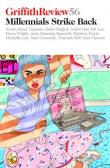 6755657647933982851.jpg
6755657647933982851.jpg
 6755657647933982851.jpg
6755657647933982851.jpg
'Millennials are making their mark on a world that is profoundly different to the one their parents knew.
'Millennials, those born in the final decades of the twentieth century, have had bad press for a long time. Now they are fighting back as they come of age in a world radically changed from that experienced by previous generations.
'Even the oldest were still in primary school when the Soviet Union collapsed, when deregulation swept the West and much of the postwar consensus was jettisoned, when the Kyoto Protocol was signed and when the internet became a reality and the world shrank. They were in their teens when the World Trade Center collapsed, and wars in Iraq and Afghanistan produced a new world order; when climate-change sceptics and shock jocks poisoned public debate; when the first dot-com boom crashed, China experimented with capitalism and revived consumerism, the global financial crisis pushed capitalism to the brink, and Facebook was born.
'The challenges this generation now face are great – political uncertainty, climate change, globalisation and economic stagnation have changed the rules of the game.
'This is the best educated, most connected generation ever, but the world they live in does not offer easy pathways – inequality is rife and traditional doors are closed. Some millennials are detached and disillusioned, but others are coming up with innovative ideas, experimenting with new ways to live and work. Their vision and energy will shape the future.
'This special edition of Griffith Review is devoted to the challenges and opportunities this generation is facing and embracing. It is co-edited by Julianne Schultz and Jerath Head.' (Website abstract)
Only literary material within AustLit's scope individually indexed. Other material in this issue includes:
-Your sons, your daughters: Mental health in the age of overtime by Courtney Landers
-A consensus for care: Reframing the future of work by Frances Flanagan
-Unpaid opportunities: How work has changed for a generation by Michael Newton
-Economic illiterates: Rewriting the rules of the game by Natalie O'Brien
-The sickness of social organisation: Inequality will be the death of us by Amy Corderoy
-Young lady, that's inappropriate: How the legal system works against women by Bri Lee
-Measuring imperfection: The limits of the quantified self Fiona Wright
-To my future child: Lessons in compromise by Keane Shum
-Worlds beyond: Teachable moments in virtual reality by Andrew McMillen
- A modern epic: The Gilgamesh quest by O'Connell, Cathal
'Sure, my generation has inherited much of this reality. But it will be on our watch that it's sustained. The game of life has been played for many a season, yet we're the ones set to play in one of the most critical times in the history of our species. At a rapid pace, we are flying towards a dystopia that could well be lived in an alternate reality - if it isn't already. The freedom promised by technology may in fact prove to limit mindsets - just look at our track record as the first generation to come of age in the digital world.' (Publication abstract)
'They're a generation more talked about than listened to, but the collective spending power of millennials is set to grow. Sarah Farquharson investigates how publishers are tapping into the millennial market.' (Publication abstract)
'They're a generation more talked about than listened to, but the collective spending power of millennials is set to grow. Sarah Farquharson investigates how publishers are tapping into the millennial market.' (Publication abstract)